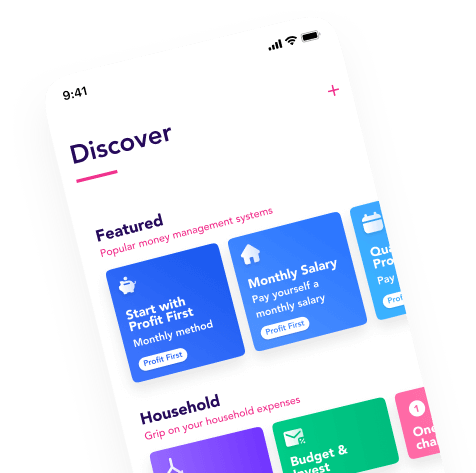
When people talk about financial surprises, they are often talking about negative surprises—ones they didn't see coming. Think traffic fines, or a high phone bill after your vacation. In addition, —and this one is surprising—most of us are also negatively surprised about expenses that come back every year!
In other words, we are surprised about costs that we know are coming. Think of (for example) city taxes. Or, for entrepreneurs, the income taxes. We know it's coming, and yet we have a bad feeling about it when it comes.
This is because all these costs have to be paid out of your spending budget. You will have less money to spend that month. You simply don't have a saving jar set aside for it. And if it were up to us, this would be a thing of the past for everyone. We believe in a future where there are no financial surprises.
Make a financial plan
You sit down to create your financial plan. It is helpful if your financial plan also works well in your daily life, so you immediately have a relaxed feeling about your money. We'd love to help you be successful, so you have a nice, complete overview right away, without feeling like you're forgetting important expenses!
Let's get started. Make an overview of your monthly obligations, other periodic obligations and your expenses:
Monthly Obligations:
- Rent or mortgage
- Gas, water, electricity
- Internet access
- Telephone
- Groceries
- Health insurance
- Car (insurance, road tax, use, depreciation)
- Other insurances (home, travel, liability)
Other periodic obligations:
- Town/County taxes
- House taxes
- Health insurance deductible
- School fees
- Childcare money
Expenses:
- Clothing
- Gifts & birthdays
- TV subscriptions
- Car maintenance
- Home maintenance
- Donations
Debts:
- Student loan
- Installments: car, TV, etc.
- Other debts
Pleasure pots:
- Outings & dining out
- Vacations
- Music
- Gaming
- Sports & Recreation
- December (holiday) extras
Financial buffer:
- Savings
- Investments
- Emergency buffer (broken washing machine, etc.)
- Home maintenance (painting, repairs, etc.)
Set aside money
Financial planning means: set up a saving jar for all of your surprises. Even more practical: for each obligation a separate bank account, with a fixed monthly deposit. For example, a monthly automatic deposit of €75 for your annual municipal taxes.

The only surprises you then have, are positive surprises. That you have reserved too much, for example.
Are all these saving jars a bit too much for you? You can put together categories that fit together in a jar. So, you keep an overview, and you're still just as prepared.
In periods of financial prosperity, it is great to build up a buffer for less profitable times. With our Flow app, we want to encourage the use of saving jars and smart distribution of your income. Simply keep track of everything in the app, even if you have several bank accounts. This way you automate your money, have a grip on your finances and only enjoy the positive surprises!
